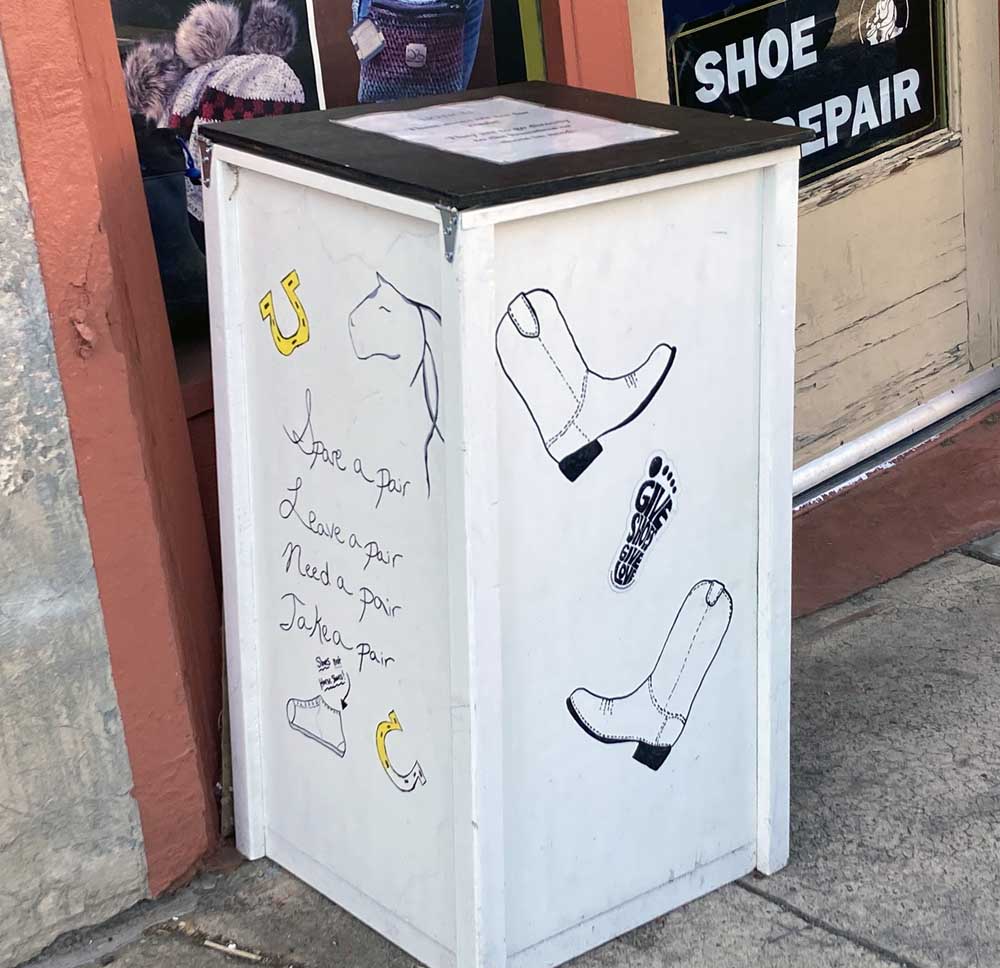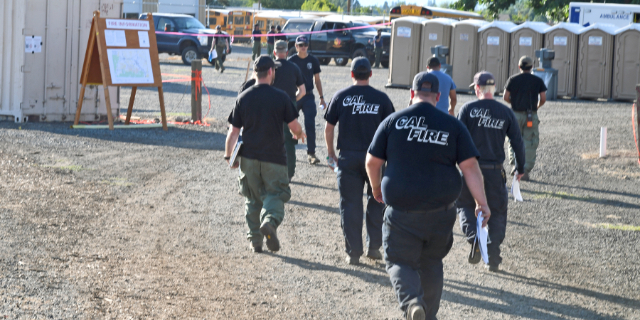Rogue Spotlight: Jerry Carpenter is cobbler to the stars
Published 12:00 am Tuesday, July 4, 2023

- Ye Olde Cobbler Shoppe in Ashland has a bin outside the front door that invites the public to "Spare a Pair, Leave a Pair; Need a Pair, Take a Pair."
It’s a case of life imitating art imitating life.
Trending
“Kinky Boots,” a 2005 British film about the owner of a struggling shoe company who forms an unlikely partnership with a drag queen cabaret performer to produce a line of boots with reinforced high heels that won’t break during a performance, was inspired by true events. Art imitating life.
Jerry Carpenter, owner of Ye Olde Cobbler Shoppe in Ashland, modified and reinforced more than 60 pairs of boots and shoes for “Kinky Boots: The Musical,” playing through Sept. 3 at Oregon Cabaret Theatre, helping ensure safety and stability for the company’s actors and dancers on stage. Life imitating art.
Carpenter picked up the Cabaret contract about two years ago when he acquired the shop from Dan Shulters, who operated it as Dan’s Shoe Repair. Shulters had been taking care of the theater company’s shoe cobbling business even before Valerie Rachelle and Rick Robinson bought the Cabaret in 2014.
Trending
“I was thrilled to get the job,” Carpenter said. “I’ve done lots of projects for them over the past couple of years.”
Carpenter, 54, learned the craft by working in his now ex-in-laws’ shoe repair business in St. Croix Falls, Wisconsin, for more than two decades before moving to Ashland after a divorce. In fact, he got a taste of doing theater work when he was in Wisconsin.
“We did all the work for the St. Croix Festival Theatre for many years,” he said.
Carpenter doesn’t create or design Cabaret’s footwear, but he does all the repairs and reinforcement for the company.
“Our costume designer chooses the shoes for each show, depending upon the design, time period, and needs of the shows,” Cabaret co-owner and artistic director Rachelle said.
The work includes repairs, stretching, attaching dance rubber, and reinforcing shoes to make them last longer. All shoes have to last for up to 82 performances, but dance shoes need special attention.
“Dancers need reinforced shoes — especially ones with heels — so that nothing will break or become dangerous while dancing,” Rachelle said.
The flamboyantly extravagant boots used in “Kinky Boots” are a special case in that they need to support the often-six-foot-tall male drag artist dancers doing elaborate routines.
“I installed rubber protective non-slip soles on most them,” Carpenter said. “I stretched a few pairs, and put metal ‘L’ brackets on the underside of the heel and sole areas to provide more stability.”
“Jerry and his team have been amazing for us,” Rachelle said. “they are willing to take shoes for quick overnight repairs, and have even taken shoes on their days off to help us out. I don’t know what we would do without their magic.”
In professional theater, the shoes are part of the costume design, so are provided by the theater.
“If we do use anyone’s personal dance or everyday shoes for a show, we are required to pay them a rental fee,” Rachelle said. “Therefore, most of the time we purchase shoes for every actor. If we do use their shoes, it is usually their dance shoes, as they are most comfortable dancing in their own shoes that have already been broken in and molded to their feet.”
The “Kinky” boots for Cabaret’s musical were purchased from numerous online sources such as FSJ Shoes, OnlyMaker Shoes, Shoe Dazzle, Amazon and others. After the show, the Cabaret will keep some and donate some, depending on the wear and tear and style.
Business a gift
Carpenter had met the shop’s former owner online in a Facebook group, Shoe Repair International (SRI). When Shulters and his wife decided to move to Africa with three years remaining on the building lease, they sold the business in a contract-for-deed agreement.
When that didn’t work out, they offered to gift the business to Carpenter in exchange for his taking over the lease. Carpenter didn’t take long to say yes. Well, he had only three days to decide.
“I had gone through a divorce after 25 years of marriage and was looking for a fresh start,” Carpenter said.
Carpenter flew out from St. Croix Falls to take a look at the shop and the town. Two weeks later, he was running the renamed business, located at 27 S. 2nd Street. That was in November of 2020.
“I am incredibly blessed,” he said. “Ashland has responded amazingly.”
The work is more than just about shoe and boot repair. Carpenter also does cleaning and shining; works on purses and luggage; does patching, stitching, and stretching; and replaces soles and heels.
“We use machine patch stitchers and hand stitching in our repair work,” he said, “using all types of materials, but mostly leather.
Shoe stretching can solve a lot of problems related to bunions, hammer toes, or the need for a wider toe box.
“The process takes about a week,” he said. “The shoe goes on a machine and is sprayed with a solution that releases the leather. The machine is cranked to a certain amount of tension to stretch the material.” The tension is adjusted incrementally each day to achieve the amount of stretch needed for an improved fit.
Tailoring services
Carpenter also offers something not usually associated with shoe repair shops: tailoring services.
Tailor Ryan Neufeld comes in three days a week — usually Thursday, Friday and Saturday — through an arrangement that offers Neufeld an internship on cobblery in exchange for bringing his services to the shop.
“I do alterations, repair, hems, and can take in a suit coat,” Neufeld said. “I have both men and women clients.”
Carpenter markets his services mostly through word-of-mouth and social networks. He regards SRI, the Facebook group, as an important resource.
“With many cobblers around the world in the online group, it is a great place to learn new techniques and for exchanging ideas,” he said.
“There have been many changes in shoe repair, but it also is just fixing stuff. Although the craft is old school, machines have been updated and modified over the years. However, hand-sewn and hand-cobbled is what people like.”
Happy customers are what it’s all about, and Carpenter has many.
One customer brought in an old pair of beloved Birkenstocks in disrepair. Carpenter added new footbeds, liners and soles, “and they looked brand new again,” he said.
A few weeks ago, an older woman brought in a shoe for a re-do on a build-up job. A build-up is an orthopedic lift to remedy leg length discrepancy. She had Carpenter do a similar job for her about two years ago at a cost of $140, but this time she tried another craftsman who offered a cheaper price.
“But she couldn’t wear them,” Carpenter said.
After Carpenter fixed the problem, she was a happy camper.
“She was happy to pay the price, because the job was done right,” he said. “She gave me a hug and cookies!”
He likes doing the work and considers it therapeutic in a way. “I enjoy the look of joy on customers’ faces when they pick up items.”
In a throw-away society where many people keep shoes until they wear out and then discard them, one might not expect that an old-fashioned shoe repair shop would attract so many customers.
People who are environmentally conscious increasingly don’t want to keep filling dumps. “And that keeps my profession going,” he said.
Some have sentimental attachments to items, many of which are family heirlooms, and are pleased to be able to have them preserved.
“We also cut back on consuming natural resources by refurbishing people’s shoes and other belongings,” he said.
Spare a pair
As a community service, Carpenter keeps a barrel outside the store for people to leave or take a pair of shoes. “I call it spare a pair,” he said. Thousands have been given away.
Carpenter has handled some valuable items in the course of his work.
“For example, I’ve worked on a pair of $2,500 shoes, on boots for WWE wrestlers, and boots for Metallica,” he said. “But, of course, everything I work on is valuable to the customers they belong to.”
Some people think Carpenter builds shoes from scratch. Not the case.
“We are cobblers, not shoemakers,” he said.
There have been other misconceptions about the business, one involving a mistaken impression.
“I have had people asking for peach cobbler, not realizing that we are a shoe repair business,” Carpenter laughed.
You may not find any peach cobbler at the shop, but you just might encounter some leftover ye olde cookies, dropped off by a satisfied customer.
For more information about Ye Olde Cobbler Shoppe, go to facebook.com/Soleman69.
For information about OCT’s production of “Kinky Boots” and to purchase tickets, see oregoncabaret.com or call 541-488-2902.









